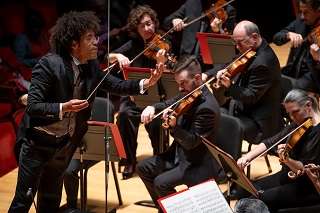|
Back
Choreographic and Academic Philadelphia
Verizon Hall
11/10/2021 - & November 11*, 12, 2021
Hector Berlioz: Roman Carnival, op. 9
Jacob Bancks: Clarinet Concerto
Antonín Dvorák: Symphony No. 7, op. 70
Ricardo Morales (clarinet)
The Philadelphia Orchestra, Rafael Payare (conductor)

R. Payare (© Jess Fusco)
Philadelphia Orchestra Principal clarinettist Ricardo Morales mesmerized the audience in Verizon Hall in the premiere of composer Jacob Bancks’ Clarinet Concerto. Even though the concert hall wasn’t near full for the second of three performances, those of us who were there knew early on that we were hearing a remarkable performance of Bancks’ innovative concerto. It was the centrepiece of a program with works by Dvorák and Berlioz conducted by Rafael Payare in his debut performance run with the Philadelphians. Payare is musical director of the San Diego Symphony, conductor laureate for Belfast’s Ulster Orchestra and is currently the newly appointed musical director of the Montreal Symphony.
Berlioz’s Roman Carnival was the perfect opener with its expressive symphonic textures framing the lustrous solo English horn. Then midway through it burst forth with orchestral exuberance with Payare articulating its depth of sound making it more than a glitter showpiece. Meanwhile, maestro Payare makes a sartorial statement on the podium – tight pants and gold button lining his tails. And some conductors don’t use a baton so their fingers can communicate more to the musicians, Payare uses his own body in expressive conductor choreography.
Then Ricardo Morales came onstage with his warm smile and launched into Bancks’ unpaused three-movement, near 30-minute piece. The first movement titled ‘Unruly’ is a thrilling collision between the soloist and the orchestra in a cyclone of shape shifting sonic architecture. Morales faces off with a dense field of percussion instruments including bongos, cabasa, crotales, glockenspiel, kick drum, splash cymbals, tam-tam, xylophone, et.al.. The brass aggressively intrudes, with all of these colliding orchestral streams, Morales’ breathless phrasing seems superhuman and remains the dynamic protagonist.
The introspective ‘Tender’ movement has a moody cinematic feel, with David Bilger’s soulful trumpet floating over lush symphonic strings. The percussion reined in with softer rhythmic tension while Morales performs the concerto’s most caressing, intimate passages. The quietness is interrupted by abstract percussion and brass, as Morales soars back in the mix for Bancks’ ‘Defiant’ finish. This is a dynamic concerto full of fresh ideas and Morales delivers a tour de force of exquisite artistry. The concerto received a much-deserved extended standing ovation and Jacob Bancks joined the Payare and the orchestra onstage. Maestro Payare reined in his choreo during the concerto, but the moves were just as dynamic.
The closer was Dvorák’s four-movement Seventh Symphony and Payare conducted an academic reading and can really land the sonic elements without leaning on them. The detailing particularly dimensional with Dvorák’s central theme in the 2nd movement. Among the outstanding lead soloists – Daniel Matsukawa (bassoon), Philippe Tondre (oboe), Patrick Williams and Jeffrey Khaner (flute) and Jennifer Montone (horn).
Lewis Whittington
|